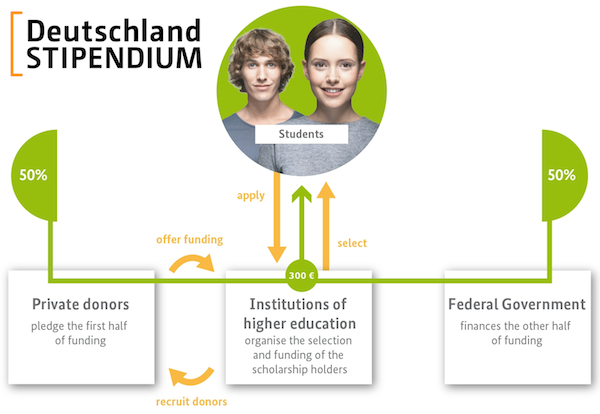
The State of Baden-Würrtemberg has decided to introduce additional fees for university students from outside the European Union (EU) or the European Economic Area (EEA).
Well this is actually not new. The regulation was passed in the State parliament of Baden Württemberg on 3rd May 2017 and enforced from September 2017 i.e. Wintersemester 2017/18.
This regulation stipulates that third state nationals, i.e. students from outside the EU, pay €1500 per semester for their undergraduate studies and €650 for post graduate studies.
The number of international students studying in Baden Württemberg has increased by 300% in the last couple of years and a further increase is expected. To ensure that the educational institutions maintained their quality, it was imperative to introduce these additional fees, the state claimed.
It was further argued that universities in many other countries e.g. Sweden, the Netherlands, Denmark, Great Britain, China, Switzerland, Austria were already charging additional fees for international students. Also the students coming to study in Baden Württemberg, many of whom are from India (30%) and China, were already paying much higher fees back home at 10,000 euros and 8,000 euros respectively.
60% of the student population in Baden Württemberg is currently made up of foreign nationals, many of whom come from countries charging much higher fees, the State reasoned.
On the fees being charged for post graduate and second degrees, the State explained that although getting higher education should not be dependent on one’s economic placement, thus the free first degree for German nationals, the second degree could not be financed by the general public. For this reason, Baden Württemberg joined other States like Rhineland-Palatinate, Saxony and Saxony-Anhalt, to introduce tuition fees for second degrees for all. For this reason also, are post graduate studies and second degrees exempt from BAföG.
Exemptions
However, some international students will be exempt from paying the fees if they are:
- Students from the European Union (EU) and European Economic Area (EEA)
- Non-Germans with a German higher education entrance qualification under § 58 LHG
- Students enrolling for a doctoral program
- Students on exchanges arising from partnership agreements with their host university (e.g. Erasmus) – § 6 Abs. 1 Landeshochschulgebührengesetz (LHGebG)
- Double Degree students from partner institutions abroad, if mutual tuition fee waivers have been agreed upon within partnership agreements – § 6 Abs. 1 LHGebG
- Family members (spouses, de facto partners, children) of citizens of EU and EEA countries under § 3 of Act on the General Freedom of Movement for EU Citizens Freedom of Movement Act/EU – § 5 Abs. 1 Nr. 1 LHGebG
- Non-EU or EEA citizens who have an EU permanent residence permit (eine Niederlassungserlaubnis oder eine Erlaubnis zum Daueraufenthalt – EU) – § 5 Abs. 1 Nr. 2 LHGebG.
- Non-EU or EEA citizens permanently residing in Germany with a residence permit for international law – § 5 Abs. 1 Nr. 5 LHGebG
- Refugees whose habitual abode is in Germany, who are recognized under the UN Convention Relating to the Status of Refugees, and whose entitlement to reside in Germany is not merely provisional – § 5 Abs. 1 Nr. 3 LHGebG
- Displaced persons under the (post-World War II) – Gesetz über die Rechtsstellung heimatloser Ausländer im Bundesgebiet – § 5 Abs. 1 Nr. 4 LHGebG
- Non-EU or EEA citizens with permanent residence in Germany who have been legally present in Germany without interruption for at least 15 months and who have a particular form of residence permit (e.g., due to a stay of deportation or other obstacle to leaving the country) – § 5 Abs. 1 Nr. 6 LHGebG
- Non-EU or EEA citizens with permanent residence in Germany who have been legally present in Germany without interruption for at least 15 months – § 5 Abs. 1 Nr. 7 LHGebG,
- Non-EU or EEA citizens who have been present in Germany for five years and have been legally employed – § 5 Abs. 1 Nr. 8 LHGebG
- Non-EU or EEA citizens with at least one parent who has lived in Germany for a total of 3 of the 6 years prior to the start of the applicant’s studies and who was legally employed – § 5 Abs. 1 Nr. 9 LHGebG
- Non-EU or EEA citizens who have completed a Bachelor’s and a Master’s degree or a Staatsexamen or diploma study program (cf. Second Degree Tuition Fees) –
§ 5 Abs. 1 Nr. 10 LHGebG
The following may apply for exemption to the fee after they receive the payment-due notice:
- Students in a practical semester which is part of their regular studies – § 6 Abs. 2 Nr. 3 LHGebG
- Students with a significant disability which hinders their studies as set out in § 2 SGB IX – § 6 Abs. 7 LHGebG
- Students on leave of absence, if the application for leave of absence was made prior to the start of semester – § 6 Abs. 2 Nr. 1 LHGebG
- Students in their year of practical training? – § 6 Abs. 2 Nr. 2 LHGebG
- Non-EU or EEA citizens with an “Aufenthaltsgestattung” residence document under § 55 paragraph 1 of the asylum law, who have citizenship of a country which the Federal Office for Migration and Refugees assesses as having a high protection quota – § 6 Abs. 6 LHGebG
If a state leaves the EU or EEA (e.g. Brexit) and if citizens of that state thereby become subject to tuition fees, citizens of that state may continue their studies without paying tuition fees if, at the time the departure from the EU or EEA becomes effective, they have been enrolled in a degree program at an institution of higher education in Baden-Württemberg for at least five semesters.










